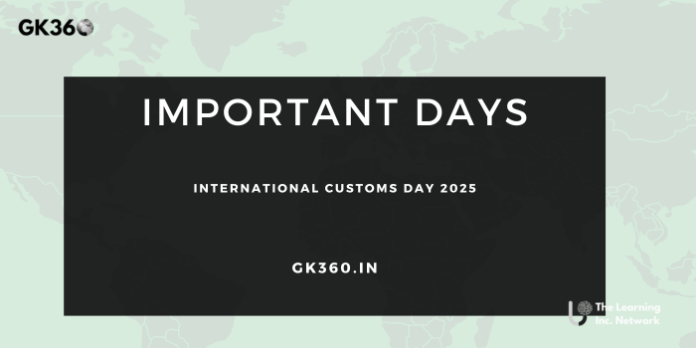International Customs Day 2025: Theme, History, and Global Impact
International Customs Day 2025 (ICD) is celebrated on January 26 each year to honor the critical role customs officials and agencies play in facilitating global trade. Led by the World Customs Organisation (WCO), this observance recognizes the importance of secure and efficient customs systems in managing cross-border trade, ensuring supply chain security, and combating illegal trade activities.
This year’s theme, “Customs Delivering on its Commitment to Efficiency, Security, and Prosperity,” underscores the ongoing efforts of customs authorities to enhance global trade processes while addressing evolving security concerns and fostering economic growth.
What is International Customs Day?
International Customs Day is a global initiative launched by the WCO to celebrate the efforts of customs administrations in connecting nations through trade. Customs agencies serve as the first line of defense at international borders, facilitating the smooth flow of goods while ensuring compliance with trade laws. With participation from 183 member states, the observance is marked by events, campaigns, and discussions on the future of customs systems.
Theme for International Customs Day 2025
The 2025 theme, “Customs Delivering on its Commitment to Efficiency, Security, and Prosperity,” emphasizes three critical goals:
- Efficiency: Streamlining trade processes to reduce delays and costs.
- Security: Enhancing border management to prevent illegal trade and smuggling.
- Prosperity: Promoting economic growth by fostering sustainable and transparent trade practices.
Customs administrations are encouraged to align their activities with this theme, focusing on innovative strategies and technology to improve global connectivity.
The History of International Customs Day
The Foundation of the WCO
The origins of International Customs Day date back to 1952, when the Customs Cooperation Council (CCC) was formed in Brussels, Belgium, to improve customs efficiency worldwide. The first session of the CCC took place on January 26, 1953, marking the birth of a unified effort to standardize customs practices globally.
Evolution to the WCO
Over the years, the CCC expanded its scope, eventually becoming the World Customs Organisation (WCO). Today, the WCO represents 183 member states, covering 98% of global trade. It is recognized as the leading authority on customs operations, offering guidance and tools to address emerging trade challenges.
Why International Customs Day is Significant
Recognizing Customs Officials
Customs officials are often the unsung heroes of global trade. Their responsibilities include:
- Enforcing trade laws and regulations.
- Preventing illegal trade and ensuring border security.
- Managing customs duties to support national revenues.
International Customs Day provides an opportunity to acknowledge their tireless efforts in maintaining the integrity of trade systems.
Promoting Awareness of Customs Laws
By observing this day, individuals and businesses are reminded of the importance of customs compliance. Greater awareness reduces the risk of delays, penalties, and illegal activities, benefiting both traders and customs officials.
Fostering Economic Prosperity
Efficient customs systems play a pivotal role in fostering economic relationships between nations. By reducing trade barriers, they promote economic development and enhance global connectivity.
Strengthening Border Security
Customs administrations combat smuggling, counterfeit goods, and other threats to national and international security. Their vigilance ensures that global trade remains secure and sustainable.
Challenges in Customs Operations
While customs systems are essential for global trade, they face several challenges, including:
- Technological Adaptation: Adopting advanced technologies like AI and blockchain to improve trade efficiency.
- Combatting Illegal Trade: Addressing the growing complexity of smuggling networks.
- Balancing Trade Facilitation and Security: Ensuring trade is seamless without compromising border security.
- Global Cooperation: Aligning customs practices across diverse nations and economies.
How International Customs Day is Celebrated
Activities by WCO Members
Each year, WCO member states organize events to celebrate International Customs Day, such as:
- Workshops and Seminars: Discussions on the latest trends in customs operations.
- Technology Demonstrations: Showcasing tools like X-ray scanners and digital customs systems.
- Awards Ceremonies: Recognizing outstanding contributions by customs officials.
Awareness Campaigns
Customs agencies also launch campaigns to educate the public about:
- Customs laws and regulations.
- The importance of compliance to prevent delays and penalties.
- The role of customs systems in securing global trade.
Future of Customs Systems
As global trade evolves, customs administrations must adapt to new challenges and opportunities. Emerging trends include:
- AI-Powered Customs Tools: Enhancing risk assessment and fraud detection.
- Blockchain Technology: Ensuring transparency and reducing paperwork in trade documentation.
- Sustainability in Customs Operations: Promoting eco-friendly trade practices to support global climate goals.
Key Facts About International Customs Day
- Foundation Year: The CCC (now WCO) was established in 1952.
- First Observance: January 26, 1953, in Brussels.
- Membership: 183 member states, representing 98% of global trade.
- Annual Theme: Focuses on efficiency, security, and sustainability in customs operations.
FAQ Section
- 1. What is the theme for International Customs Day 2025?The theme is “Customs Delivering on its Commitment to Efficiency, Security, and Prosperity.”
- 2. Why is January 26 celebrated as International Customs Day?It marks the date of the first session of the Customs Cooperation Council (CCC) in 1953, which later became the World Customs Organisation (WCO).
- 3. How does the WCO support customs administrations?The WCO provides guidance, training, and tools to enhance customs operations worldwide, ensuring efficiency, security, and compliance in global trade.
- 4. What challenges do customs systems face today?Key challenges include adopting advanced technologies, combating smuggling and illegal trade, balancing trade facilitation with security, and fostering global cooperation among nations.
- 5. What is the role of customs in economic growth?Customs systems reduce trade barriers, ensure smooth and transparent trade operations, and contribute to sustainable development by enhancing global connectivity and revenue generation.





